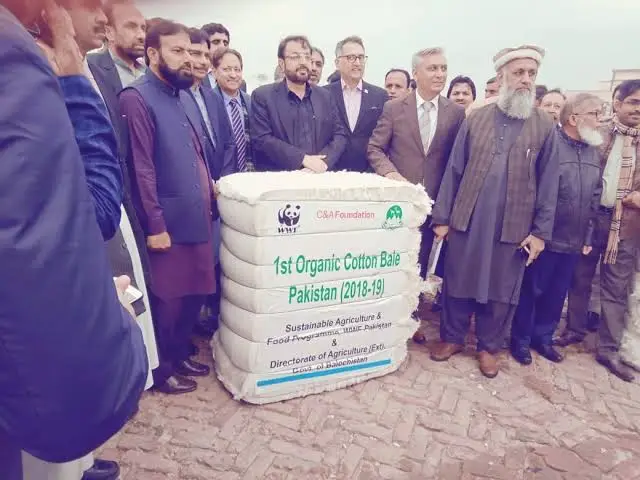In a significant development for the country’s agricultural sector, Balochistan celebrated the certification of Pakistan’s first-ever organic cotton bale during a ceremony held on Wednesday at Kot Sabzal in Rahim Yar Khan. This event marks a major milestone for the cotton industry in Pakistan, with the potential to elevate the country’s standing in sustainable agriculture and open up new markets for organic cotton globally.
The Rise of Organic Cotton in Pakistan
For decades, Pakistan has been a leading global cotton producer, but the shift towards organic cultivation reflects the increasing demand for sustainable and eco-friendly farming practices. Organic cotton is grown without the use of synthetic pesticides, fertilizers, and genetically modified seeds. It is produced using natural processes, which benefits not only the environment but also the health of farmers and workers.
The certification of this first organic cotton bale is the result of years of effort from local farmers, agriculture experts, and government bodies who have collaborated to shift a portion of cotton production toward organic methods. This initiative is especially significant as cotton is one of Pakistan’s most valuable cash crops, contributing heavily to its economy.
Importance for Balochistan’s Agricultural Sector
Balochistan, primarily known for its arid climate and challenging agricultural conditions, has now taken a step toward diversifying its agricultural production. Organic farming requires diligent care but yields higher returns in premium markets. By embracing organic cotton farming, the province could provide new economic opportunities for local farmers and strengthen Pakistan’s export capabilities in international markets, which increasingly favor sustainable products.
Environmental and Economic Impact
The move towards organic cotton farming is expected to have far-reaching environmental and economic benefits. Organic cotton cultivation helps reduce the carbon footprint and water usage while promoting biodiversity by eliminating harmful chemicals. For farmers, organic cotton can command higher prices due to its premium status in both local and global markets, potentially increasing their income levels.
Moreover, the certification of this organic cotton bale can lead to greater adoption of organic practices in other regions of Pakistan, as farmers observe the economic advantages and ecological benefits.
A Promising Future for Organic Cotton in Pakistan
With growing global awareness about the environmental impacts of textile production, the demand for organic cotton is on the rise. The certification of Pakistan’s first organic cotton bale represents the beginning of a new era for the country’s cotton industry. By adopting organic farming practices, Pakistan could position itself as a key player in the international organic cotton market.
This achievement at Kot Sabzal signals the potential for a broader shift toward sustainable agriculture in Pakistan, helping the country not only improve its environmental stewardship but also enhance the livelihoods of its farmers and the competitiveness of its cotton exports.
As the country takes this important step, stakeholders in agriculture and trade look forward to further advancements in organic cotton production, making Pakistan a vital contributor to the global movement for sustainable textiles.


I conceive other website owners should take this web site as an example , very clean and great user genial style.